r ••••■■ Hauliers on the Borders and in Dumfries Galloway
Page 48
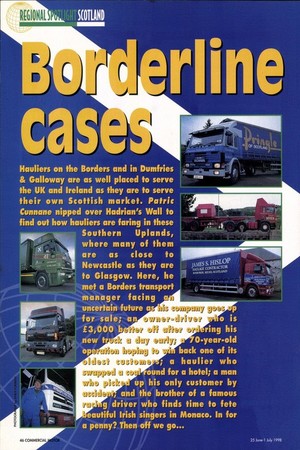
Page 49
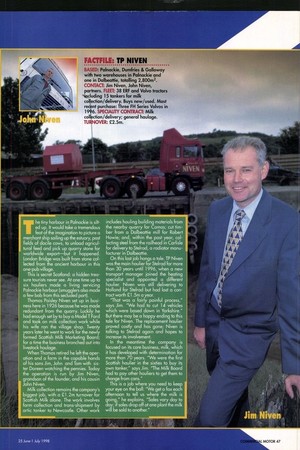
Page 50
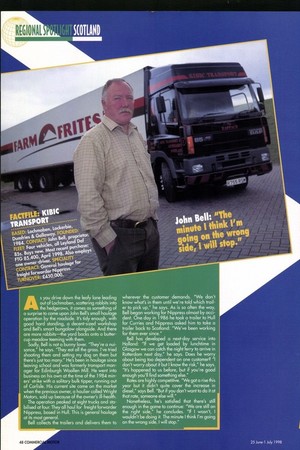
Page 51
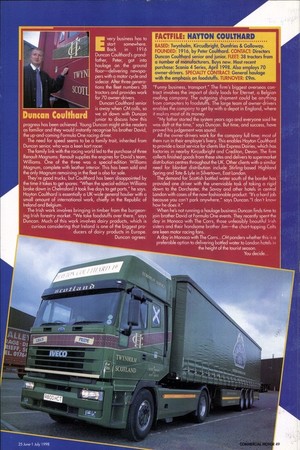
Page 52
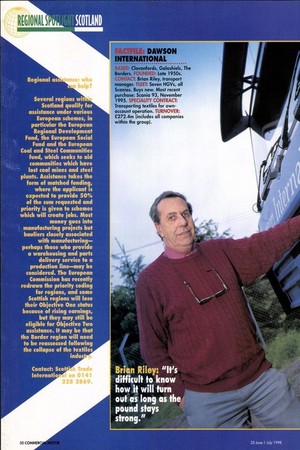
Page 53
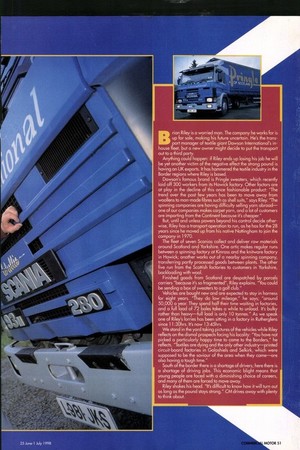
Page 54
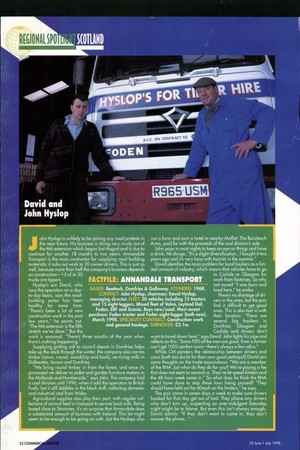
Page 55
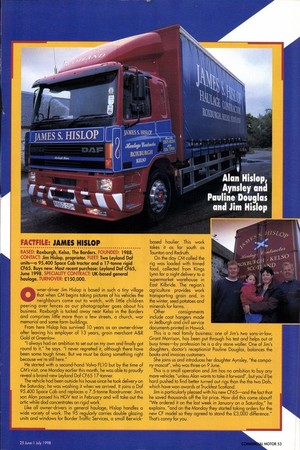
If you've noticed an error in this article please click here to report it so we can fix it.
are as well placed to serve the UK and Ireland as they are to serve their own Scottish market. Patric Cunnane nipped over Hadrian's Wall to find out how hauliers are faring in these Southern Uplands, where many of them t‘'‘ are as close to 8°)T"ND11 ft‘ Newcastle as they are • to Glasgow. Here, he met a Borders transport manager facing • uncertain future a,ith 'p for sale; an .91,i_ii:Le-i:J211/± 10 is /3,000 bii iiLJJ1_12 ring his new 0-year-old back one of its , a haulier who Li ound for a hotel; a man iij91.s"jS:-'. up his only customer by and the brother of a famous jJJ g driver who finds time to fete eautiful Irish singers in Monaco. In for a penny? Then off we go... FACTFILE: TP NIVEN BASED: Palnackie, Dumfries & Galloway with two warehouses in Palnackie and one in Dalbeattie, totalling 2,800m2. CONTACT: Jim Niven, John Niven, partners. FLEE 38 ERF and Volvo tractors including 15 tankers for milk collection/delivery. Buys new/used. Most recent purchase: Three FH Series Volvos in 1996. SPECIALITY CONTRACT: Milk collection/delivery; general haulage. TURNOVER: £2.5m.
he tiny harbour in Palnackie is silt ed up. It would take a tremendous feat of the imagination to picture a merchant ship sailing up the estuary, past fields of docile cows, to unload agricultural feed and pick up quarry stone for worldwide export—but it happened. London Bridge was built from stone collected from the ancient harbour in this one-pub village. This is secret Scotland: a hidden treasure tourists never see. At one time up to six hauliers made a living servicing Palnackie harbour (smugglers also made a few bob from this secluded port). Thomas Paisley Niven set up in business here in 1926 because he was made redundant from the quarry. Luckily he had enough set by to buy a Model T Ford and took on milk collection work while his wife ran the village shop. Twenty years later he went to work for the newly Formed Scottish Milk Marketing Board; for a time the business branched out into livestock haulage. When Thomas retired he left the operation and a farm in the capable hands of his sons Jim, John and Tom with sister Doreen watching the pennies. Today the operation is run by Jim Niven, grandson of the founder, and his cousin John Niven.
Milk collection remains the company's biggest job, with a £.1.2m turnover for Scottish Milk alone. The work involves farm collection and trans-shipment by artic tanker to Newcastle. Other work includes hauling building materials from the nearby quarry for Camas; cut timber from a Dalbeattie mill for Robert Howie; and, within the past year, collecting steel from the railhead in Carlisle for delivery to Stelrad, a radiator manufacturer in Dalbeattie.
On this last job hangs a tale. TP Niven was the main haulier for Stelrad for more than 30 years until 1996, when a new transport manager joined the heating specialist and appointed a different haulier. Niven was still delivering to Holland for Stelrad but had lost a contract worth £1.5m a year. "That was a fairly painful process," says Jim. "We had to cut 14 vehicles which were based down in Yorkshire." But there may be a happy ending to this tale for Niven. The replacement haulier proved costly and has gone; Niven is talking to Stelrad again and hopes to increase its involvement.
In the meantime the company is focused on its core business, milk, which it has developed with determination for more than 70 years. "We were the first Scottish haulier in the sixties to buy its own tanker," says Jim. "The Milk Board had to pay other hauliers to get them to change from cans." This is a job where you need to keep your eye on the ball: "We get a fax each afternoon to tell us where the milk is going," he explains. "Sales vary day to day; if sales drop off at one plant the milk will be sold to another." fACTIF1LE: %URIC TRANSPORT BASED: Lochmaben, lockerble, Dumfries & Galloway. FOUNDED° 1984. CONTACT: John Bell, proprietor. FLEET: Four yelicles, all Leyland Oaf new. Most recent purcllas 85s. Buys e: FTG 85.400, April 1998. Also employs one owner-driver. SPECIALITY CONTRA, General houtage for freight forwarder Nippress. TURNOVER: £450,000.
As you drive down the leafy lane leading out of Lochmaben, scattering rabbits into the hedgerows, it comes as something of a surprise to come upon John Bell's small haulage operation by the roadside. It's tidy enough, with good hard standing, a decent-sized workshop and Bell's smart bungalow alongside. And there are more rabbits—the yard backs onto a buttercup meadow teeming with them. Sadly, Bell is not a bunny lover. "They're a nuisance," he says. "They eat all the grass. I've tried shooting them and setting my dog on them but there's just too many." He's been in haulage since leaving school and was formerly transport manager for Edinburgh Woollen Mill. He went into business on his own at the time of the 1984 miners' strike with a solitary bulk tipper, running out of Carlisle. His current site came on the market when the previous owner, a haulier called Wright Motors, sold up because of the owner's ill-health.
The operation peaked at eight trucks and stabilised at four. They all haul for freight forwarder Nippress, based in Hull. This is general haulage at its most general. Bell collects the trailers and delivers them to wherever the customer demands. "We don't know what's in them until we're told which trailer to pick up," he says. As is so often the way, Bell began working for Nippress almost by accident. One day in 1986 he took a trailer to Hull for Curries and Nippress asked him to take a trailer back to Scotland: "We've been working for them ever since."
Bell has developed a next-day service into Holland: "If we get loaded by lunchtime in Glasgow we can catch the night ferry to arrive in Rotterdam next day," he says. Does he worry about being too dependent on one customer? "I don't worry about it but I know the risk," he says. "It's happened to us before, but if you're good enough you'll find something else." Rates are highly competitive. "We got a rise this year but it didn't quite cover the increase in diesel," says Bell. "But if you don't want to do it at that rate, someone else will."
Nonetheless, he's satisfied that there's still enough in the game to continue: "We are still on the right side," he concludes. "If I wasn't, I wouldn't be doing it. The minute I think I'm going on the wrong side, I will stop." FACTFILE: HAYTON COULTHARD BASED: Twynholm, Kircudbright, Dumfries & Galloway. FOUNDED: 1916, by Peter Coulthard. CONTACT: Directors Duncan Coulthard senior and junior. FLEET: 38 tractors from a number of manufacturers. Buys new. Most recent purchase: Scania 4 Series, April 1998. Also employs 70 owner-drivers. SPECIALTY CONTRACT: General haulage with the emphasis on foodstuffs. TURNOVER: E9m. Every business has to start somewhere. Back in 1916 Duncan Coulthard's grandfather, Peter, got into haulage on the ground floor—delivering newspapers with a motor cycle and sidecar. After three genera tions the fleet numbers 38 tractors and provides work for 70 owner-drivers.
Duncan Coulthard senior The need for speed seems to be a family trait, inherited from Duncan senior, who was a keen kart racer.
The family link with the racing world led to the purchase of three Renault Magnums: Renault supplies the engines for David's team, Williams. One of the three was a special-edition Williams Magnum, complete with leather interior. This has been sold and the only Magnum remaining in the fleet is also for sale. They're good trucks, but Coulthard has been disappointed by the time it takes to get spares: "When the special-edition Williams broke down in Chelmsford it took five days to get parts," he says. Hayton Coulthard is essentially a UK-wide general haulier with a small amount of international work, chiefly in the Republic of Ireland and Belgium.
The Irish work involves bringing in timber from the burgeoning Irish forestry market. "We take foodstuffs over there," says Duncan. Much of this work involves dairy products, which is curious considering that Ireland is one of the biggest producers of dairy products in Europe. Duncan agrees: "Funny business, transport." The firm's biggest overseas contract involves the import of daily loads for Eternet, a Belgian roofing company. The outgoing shipment could be anything from computers to foodstuffs. The large team of owner-drivers enables the company to get by with a depot in England, where it makes most of its money. "My father started the system years ago and everyone said he was daft at the time," says Duncan. But time, and success, have proved his judgement was sound. All the owner-drivers work for the company full time; most of them run in their employer's livery. This enables Hayton Coulthard to provide a local service for clients like Express Dairies, which has factories in nearby Kircudbright and Crediton, Devon. The firm collects finished goods from these sites and delivers to supermarket distribution centres throughout the UK. Other clients with a similar need for blanket distribution include Stirling-based Highland Spring and Tate & Lyle in Silvertown, East London. The demand for Scottish bottled water south of the border has provided one driver with the unenviable task of taking a rigid down to the Dorchester, the Savoy and other hotels in central London with cases of the now-fashionable product: "It's a hard job because you can't park anywhere," says Duncan."I don't know how he does it."
When he's not running a haulage business Duncan finds time to join brother David at Formula One events. They recently spent the day in Monaco with The Corrs, those unfeasibly beautiful Irish sisters and their handsome brother Jim—the chart-topping Celts are keen motor racing fans. A day in Monaco with The Corrs...CM ponders whether this is a preferable option to delivering bottled water to London hotels in the height of the tourist season.
You decide... DAWSON INTERNATIONAL Clovanfords, Galashiels, The Borders. Late 1950s. Brian Riley, transport manager. Seven HGVs, all Scanias. Buys new. Most recent purchase: Scania 93, November 1995. CONTRACT: Transporting textiles for ownaccount operation. TURNOVER: £272.4m (includes all companies within the group).
Brian Riley is a worried man. The company he works for is up for sale, making his future uncertain. He's the transport manager of textile giant Dawson International's inhouse fleet, but a new owner might decide to put the transport out to a third party. Anything could happen: if Riley ends up losing his job he will be yet another victim of the negative effect the strong pound is having on UK exports. It has hammered the textile industry in the Border regions where Riley is based. Dawson's famous brand is Pringle sweaters, which recently laid off 300 workers from its Hawick factory. Other factors are at play in the decline of this once fashionable product: "The trend over the past few years has been to move away from woollens to man-made fibres such as shell suits," says Riley. "The spinning companies are having difficulty selling yarn abroad— one of our companies makes carpet yarn, and a lot of customers are importing from the Continent because it's cheaper." But, until and unless powers beyond his control decide otherwise, Riley has a transport operation to run, as he has for the 28 years since he moved up from his native Nottingham to join the company in 1970. The fleet of seven Scanias collect and deliver raw materials around Scotland and Yorkshire. One artic makes regular runs between a spinning factory at Kinross and the knitware factory in Hawick; another works out of a nearby spinning company, transferring partly processed goods between plants. The other five run from the Scottish factories to customers in Yorkshire, backloading with wool. Finished goods from Scotland are despatched by parcels carriers "because it's so fragmented", Riley explains. "You could be sending a box of sweaters to a golf club." Vehicles are bought new and are expected to stay in harness for eight years. "They do low mileage," he says; "around 50,000 a year. They spend half their time waiting in factories, and a full load of 72 bales takes a while to unload. It's bul rather than heavy—full load is only 10 tonnes." As we spea one of Riley's lorries has been sitting in a factory in Rutherglens since 11:30hrs. It's now 13:45hrs.
We stand in the yard taking pictures of the vehicles while Riley reflects on the dismal prospects facing his locality: "You have not picked a particularly happy time to come to the Borders," he reflects. "Textiles are dying and the only other industry—printed circuit-board factories in Galashiels and Selkirk, which were supposed to be the saviour of the area when they came—are also having a tough time." South of the border there is a shortage of drivers; here there is a shortage of driving jobs. This economic blight means that young people are faced with a diminishing choice of careers, and many of them are forced to move away. Riley shakes his head. "It's difficult to know how it will turn out as Ion as the pound stays strong." CM drives away with plenty FACTFILE: ANNAND BASED: Beattock, Dumfries & Galloway. FOUNDED 1968. CONTACT John Hyslop, chairman; David Hyslop, managing director. 30 vehicles including 15 tractors and 15 eight-leggers. Mixed fleet of Volvo, Leyland Daf, Foden, ERF and Scania. Buys new/used. Most recent purchase: Foden tractor and Foden eight-legger (both new), March 1998. SPECIALITY CONTRACT: Construction work and general haulage. TURNOVER. £3.1m. John Hyslop is unlikely to be joining any road protests in the near future. His business is doing very nicely out of the M6 extension which began last August and is due to continue for another 18 months to Iwo years. Annandale Transport is the main contractor for supplying road building materials; it subs out work to 20 owner-drivers. This is just as well, because more than half the company's business depends on construction-15 of its 30 trucks are tippers.
runs the operation on a dayto-day basis, says the roadbuilding sector has been healthy for some time: "There's been a lot of new construction work in the past few years," he points out. "The M6 extension is the fifth stretch we've done." But the work is seasonal: "There's three there's nothing happening." Hyslop's son David, who Supplying gritting salt to council depots in Dumfries helps take up the slack through the winter; the company also carries timber (sawn, round, woodchip and bark), servicing mills in Dabeanie, Annan and Dumfries.
"We bring round timber in from the forest, and once it's processed we deliver to pallet and garden furniture makers in the Midlands and Humberside," says John. The company had a coal division until 1996, when it sold the operation to British Fuels, but it still dabbles in the black stuff, collecting domestic and industrial coal from Wales.
Agricultural supplies also play their part, with regular collections of animal feed in Liverpool to service local mills. Being based close to Stranraer, it's no surprise that Annandale does a substantial amount of business with Ireland. This lot might seem to be enough to be going on with, but the Hyslops also months of the year when run a farm and own a hotel in nearby Moffat: The Buccleuch Arms, paid for with the proceeds of the coal division's sale. John pops in most nights to keep an eye on things and have a drink. He shrugs: "It's a slight diversification.. .1 bought it two years ago and it's very busy with tourists in the summer." David identifies the main problem for local hauliers as a limited amount of industry, which means that vehicles have to go to Carlisle or Glasgow for work from factories. So why not move? "I was born and bred here," he smiles.
There's no shortage of drivers in the area, but the pair find it difficult to get good ones. This is also tied in with their location: "There are several big hauliers in Dumfries, Glasgow and Carlisle and drivers don't want to travel down here," says David. John lights his pipe and reflects on this: "Some 95% of the men are good. Even a farmer can't get 100% perfect cows—there's always a few relics." While CM ponders the relationship between drivers and cows (both too docile for their own good perhaps?) David airs some thoughts on the trade associations: "We are a member of the RHA ,but what do they do for you? We're paying a fee that does not seem to reward us. They've let speed limiters and the 48-hour week come in." So what does he think the RHA could have done to stop these laws being passed? "They should have held out for 60mph on the limiters," he says.
The pair come in seven days a week to make sure drivers booked for that day get out of bed. They phone any drivers who don't turn up, suspecting an over-indulgent Saturday night might be to blame. But even this isn't always enough, David admits: "If they don't want to come in, they don't answer the phone..." ALE TRANSPORT FACTFILE: JAMES HISLOP BASED: Roxburgh, Kelso, The Borders. FOUNDED 1988. CONTACT: Jim Hislop, proprietor. FLEET: Two Leyland Daf units—a 95.400 Space Cab tractor and a 17-tonne rigid CF65. Buys new. Most recent purchase: Leyland Daf CF65, June 1998. SPECIALITY CONTRACT: UK-based general haulage. TURNOVER: £150,000.
wner-driver Jim Hislop is based in such a tiny village that when CM begins taking pictures of his vehicles the neighbours come out to watch, with little children peering over fences as our photographer goes about his business. Roxburgh is tucked away near Kelso in the Borders and comprises little more than a few streets, a church, war memorial and some farm buildings. From here Hislop has survived 10 years as an owner-driver after leaving his employer of 13 years, grain merchant A&R Gold at Greenlaw.
"I always had an ambition to set out on my own and finally got round to it," he says. "I never regretted it, although there have been some tough times. But we must be doing something right because we're still here."
He started with a second-hand Volvo FL] but by the time of CM'S visit, one Monday earlier this month, he was able to proudly reveal a brand-new Leyland Daf CF65 17-tonner.
The vehicle had been outside his house since he took delivery on the Saturday; he was washing it when we arrived. It joins a Daf 95.400 Space Cab and replaces a 7.5-tonne Roadrunner. Jim's son Alan passed his HGV test in February and will take out the artic while dad concentrates on rigid work.
Like all owner-drivers in general haulage, Hislop handles a wide variety of work. The 95 regularly carries double glazing units and windows for Border Traffic Services, a small Berwick based haulier. This work takes it as far south Taunton and Redruth.
On the day CM called the rig was loaded with tinned food, collected from Kings Lynn for a night delivery to a supermarket warehouse in East Kilbride. The region's agriculture provides work transporting grain and, in the winter, seed potatoes and minerals for farms.
Other consignments include coat hangers made in Jedburgh and civil service documents printed in Hawick.
This is a real family business: one of Jim's two sons-in-law, Grant Morrison, has been put through his test and helps out at busy times—by profession he is a dry stone wailer. One of Jim's daughters, doctor's receptionist Pauline Douglas, balances the books and invoices customers.
She joins us and introduces her daughter Aynsley, "the company mascot", who was three on 9 June. This is a small operation and Jim has no ambition to buy any more vehicles "unless Alan wants to take it forward", but you'd be hard pushed to find better turned out rigs than the the two Dafs, which have won awards at Truckfest Scotland.
Jim is particularly pleased with his new CF65—and the fact that he saved thousands off the list price. How did this come about? "We ordered it on the last week in January on a Saturday," he explains, "and on the Monday they started taking orders for the new CF model so they agreed to stand the 23,000 difference." That's canny for you. Regional ass Several regions wit Scotland qualify for assistance under various European schemes, in particular the European Regional Development Fund, the European Social Fund and the European Coal and Steel Communities fund, which seeks to aid communities which have lost coal mines and steel plants. Assistance takes the form of matched funding, where the applicant is expected to provide SO% of the sum requested and Priority is given to schemes which will create jobs. Most money goes into manufacturing projects but hauliers closely associated with manufacturing— perhaps those who provide a warehousing and parts delivery service to a production line—may be considered. The European Commission has recently redrawn the priority coding for regions, and some Scottish regions will lose their Objective One status because of rising earnings, but they may still be eligible for Objective Two assistance. It may be that the Border region will need to be reassessed following the collapse of the textiles indus Contact: Scot • Internatio
























































































































